You may have heard that Mountain Dew Kickstart might just be what you need to kickstart your day.
But, does it actually work? Or is it just a placebo?
In brief, Mountain Dew Kickstart works well as an energy drink. It has 90mg of caffeine which is just the right amount of kick to get you up and moving, but not enough to put you in overdrive.
For a more detailed analysis, read further down below to know more about whether Mountain Dew Kickstart works or not.
Contents
Mountain Dew Kickstart Nutrition Facts
Firstly, here’s a convenient table showing the nutritional value of Mountain Dew Kickstart.
| Nutrition Facts | Amount per 16 fl.oz can |
| Calories | 80 calories |
| Protein | 0g |
| Fat (Of which Saturated) | 0g (0g) |
| Carbohydrate (Of which Sugars) | 21g (20g) |
| Sodium | 170mg |
| Caffeine | 90mg |
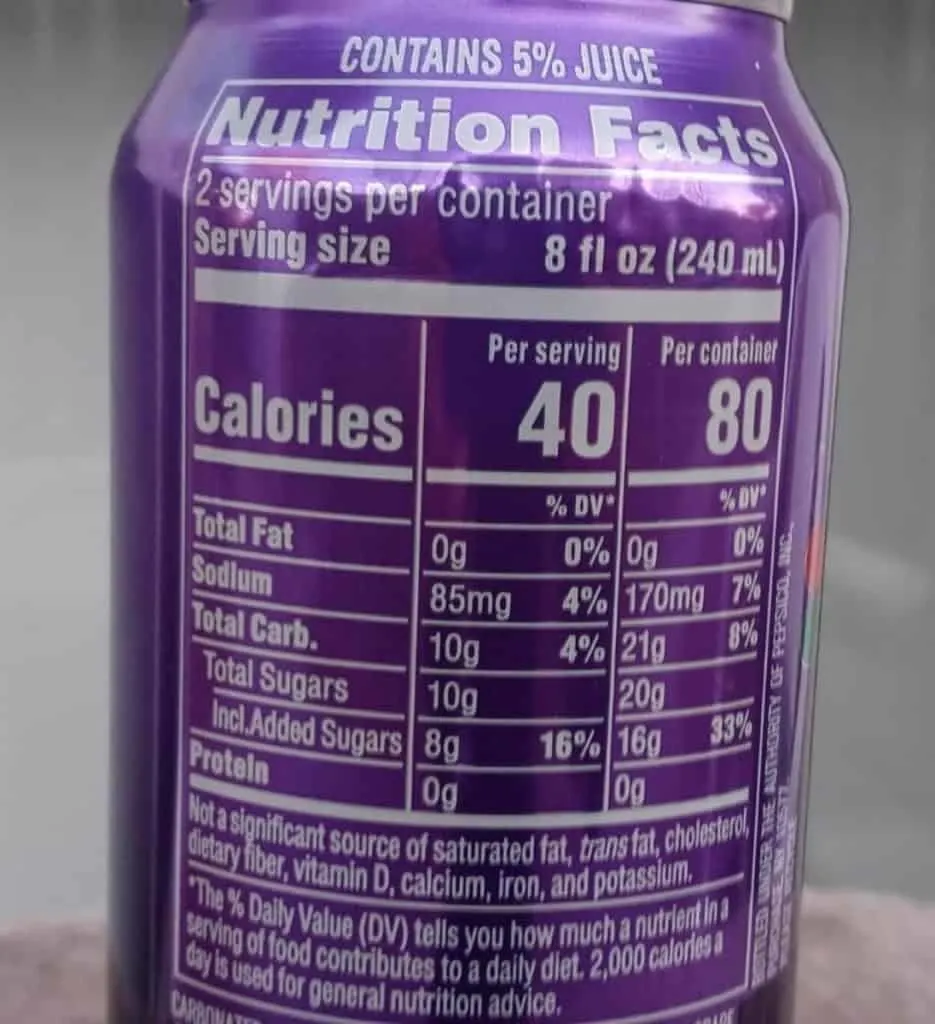
How Many Calories Are In Mountain Dew Kickstart?
A standard can of 16fl.oz of Mountain Dew Kickstart has 80 calories, which is a modest amount compared to other sugar energy drinks.
While it definitely won’t affect your daily calorific intake much, unlike Red Bull or Monster, you still have to consume it in moderation as it’s just as easy to over-consume it.
For guidance, healthy adults are recommended to consume between 2000 to 2400 calories for women and 2400 to 3000 calories for men, according to the FDA.
That said, Mountain Dew Kickstart offers a healthy dose of calories that you can burn off if you have a regular exercise routine. So, if you’re looking for an extra energy boost, it’ll make a great pick-me-up.
However, just like any energy drink, you shouldn’t use it as a meal substitute. So, always have a proper meal before drinking a can of Mountain Dew Kickstart to enjoy its benefits fully.
Mountain Dew Kickstart Ingredient List
Here’s a list of ingredients you can find in a 16fl. oz can of Mountain Dew Kickstart:
- Carbonated Water
- High Fructose Corn Syrup
- White Grape Juice Concentrate
- Citric Acid
- Sodium Polyphosphates (Preservative)
- Natural Flavor
- Potassium Sorbate (Preservative)
- Caffeine
- Potassium Citrate
- Potassium Chloride
- Gum Arabic
- Acesulfame Potassium (Artificial Sweetener)
- Sucralose (Artificial Sweetener)
- Red 40 (Coloring)
- Calcium Disodium EDTA
- Salt
- Sucrose Acetate Isobutyrate
- Blue 1 (Coloring)
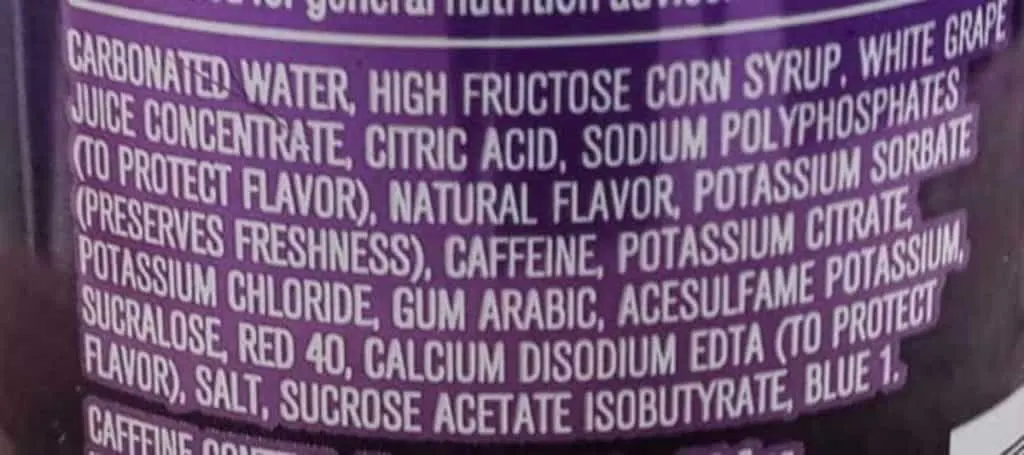
Does Mountain Dew Kickstart have Caffeine?
Mountain Dew Kickstart has 90mg of caffeine per 16 fl.oz can, which is well below the safety suggestion of 400mg of daily caffeine consumption for healthy adults.
In this perspective, Mountain Dew Kickstart might be a good option if you’re sensitive to caffeine. Likewise, the amount of caffeine in Mountain Dew Kickstart is low, especially compared to other alternatives.
So if you’re used to drinking a lot of caffeine, you may find yourself drinking multiple cans to get its full effects which isn’t the healthiest alternative in general.
The reason being is that consuming high caffeine content may lead to some notable side effects, which include:
- Insomnia
- Shakiness
- Anxiety
- Stomachache
- Nausea
- Headaches
If you want to learn more about how much caffeine is safe and its effects, watch the informative video below:
Does Mountain Dew Kickstart Have Sugar?
A 16fl.oz can of Mountain Dew Kickstart has 20g of sugar.
While having extra sugar to satisfy a sweet tooth is fine, consuming too much of it may be detrimental to your health.
Generally, regularly consuming lots of sugar can be bad for your health in the long run as they cause health issues such as:
- Acne
- Tooth Decay
- Weight gain
- Diabetes
- High blood pressure
- Cardiovascular disease
Mountain Dew Kickstart also contains high fructose corn syrup (HFCS) which comes from corn syrup and is regularly used as a flavour enhancer. Thus, it’s considered an artificial sweetener.
The downside regarding this sweetener is that studies believe HFCS can cause health problems such as insulin resistance and metabolic syndrome, especially if there’s an excessive amount of it in your diet.
In any case, be sure to keep your overall sugar intake in mind; moderation is definitely key if you have Mountain Dew Kickstart, so I would recommend sticking to one can a day, or only when you really need the boost.
Does Mountain Dew Kickstart Use Artificial Sweeteners?
Besides high fructose corn syrup, Mountain Dew Kickstart also uses artificial sweeteners like acesulfame potassium and sucralose.
While artificial sweeteners are about 200 to 600 times sweeter than regular sugar, they also contain zero calories, so you won’t need to worry about extra calorie intake in your diet. Thus, they’re so commonly used in sugar-free energy drinks.
You may notice that there’s already sugar present in Mountain Dew Kickstart, so why use artificial sweeteners? I think the use of artificial sweeteners is merely to enhance the sweetness of the drink.
According to the FDA, artificial sweeteners are safe to consume. This makes them great alternatives to sugar especially if you’re diabetic.
But keep in mind that there are still many concerns over the use of artificial sweeteners and how they can affect our health in the long run.
That said, my advice is to consume Mountain Dew Kickstart in moderation and not have multiple cans in one day. You can also consult your health specialist if you’re still unsure about adding sweeteners to your diet.
Is Mountain Dew Kickstart an Energy Drink?
In short, Mountain Dew Kickstart is not advertised as an energy drink.
It is a flavored sparkling juice beverage from concentrates with other natural flavors. With just the right amount of kick.
PepsiCo
Although it does have caffeine in it, the amount is significantly lower compared to other options of energy drinks in the market.
In my opinion, I consider it more as caffeinated juice rather than an energy drink. Not exactly just a soda/juice but also not exactly an energy drink.
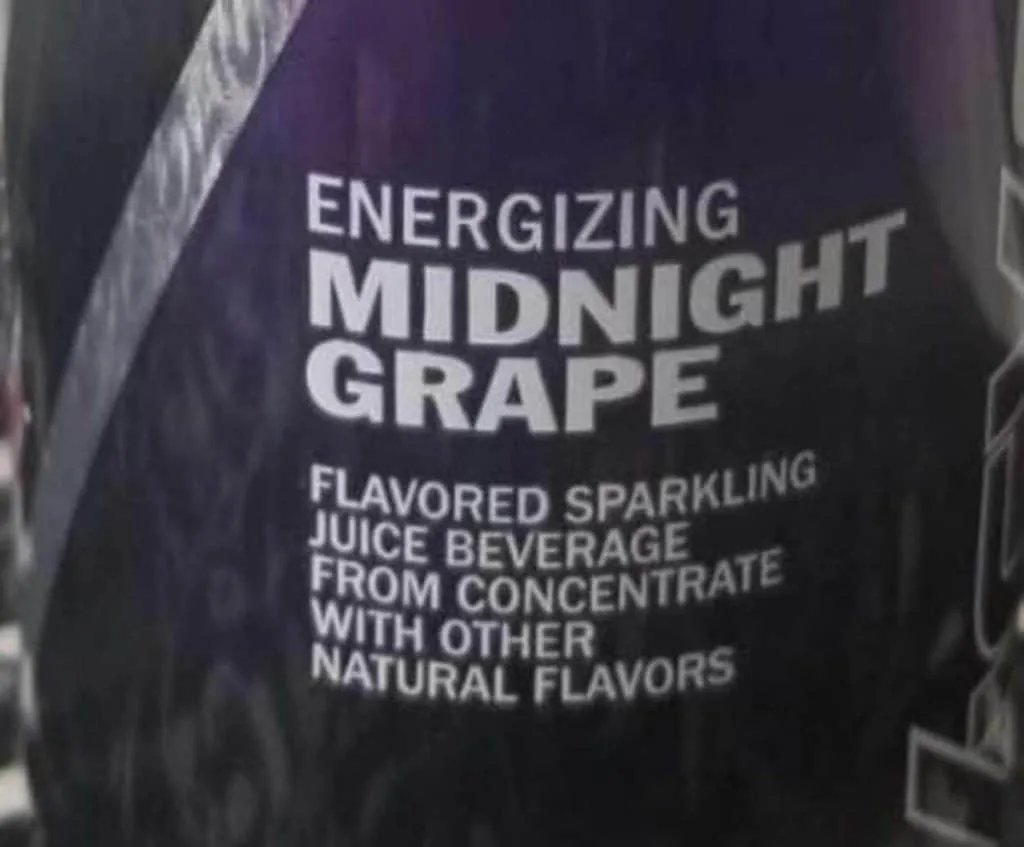
Is Mountain Dew Kickstart Better than Coffee?
Mountain Dew Kickstart is great if you want a short-term spike in energy, while coffee would be better in terms of the amount of caffeine and the fact that you can control your sugar content based on your preference.
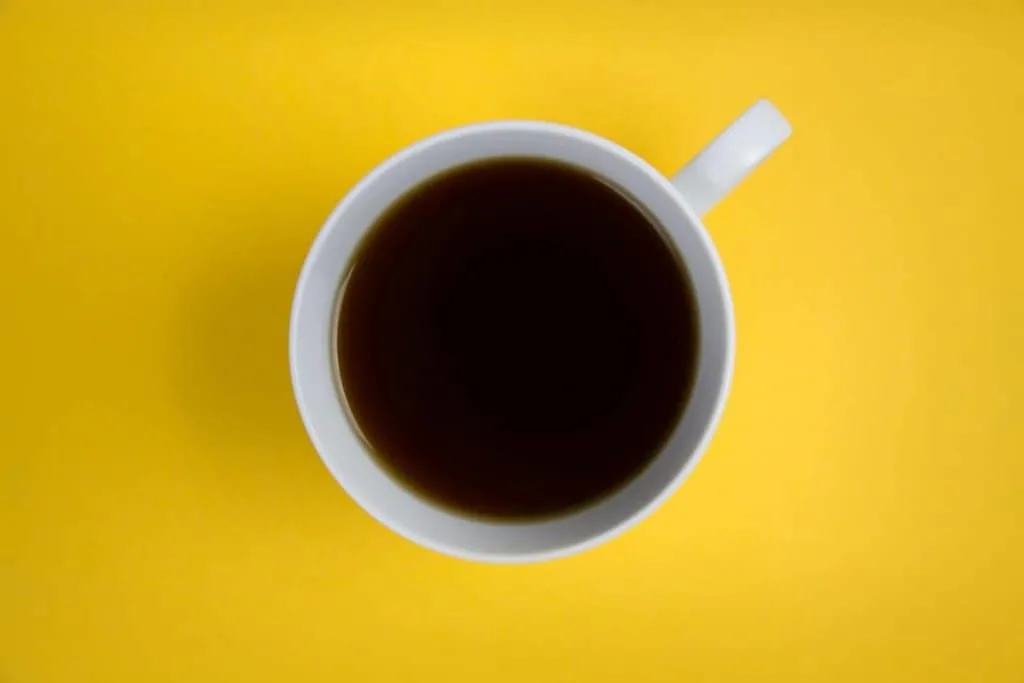
When it comes to comparing Mountain Dew Kickstart with Coffee, the two main factors you have to consider is the caffeine and sugar content for each of the drinks.
Using the data I gathered from here, have a quick look at the comparison of caffeine content in both drinks below:
| Drinks | Size (fl. oz) | Caffeine Content (mg) |
| Brewed | 8 | 96 |
| Brewed, decaf | 8 | 2 |
| Espresso | 1 | 64 |
| Espresso, decaf | 1 | 0 |
| Instant | 8 | 62 |
| Instant, decaf | 8 | 2 |
| Mountain Dew Kickstart | 16 | 90 |
At first glance, it may look like Mountain Dew Kickstart has more caffeine than brewed coffee, but by looking at the sizes, it shows that a regular brewed coffee has more caffeine despite being half the amount of one can.
That said, if you’re a bit more conscious of your sugar intake, I recommend you opt for coffee. But of course, nothing beats water when it comes to healthy options to drink.
In terms of sugar-wise, it’s well-known that it’s a quick-fix for your energy levels, but it’s also not the healthiest ingredient either. Excessively consuming added sugar can lead to health issues such as obesity, diabetes, and heart diseases.
This is why the American Heart Association (AHA) has a daily recommendation of no more than 100 calories from added sugars for most women and 150 calories from added sugars for men.
It’s also important to note that the amount of sugar in your coffee varies depending on if it’s coffee from a café, instant coffee, or one that you made at home.
For this part, I’ll use regular brewed coffee at home as our reference. Thus, with coffee, you can control the amount of sugar that it can have.
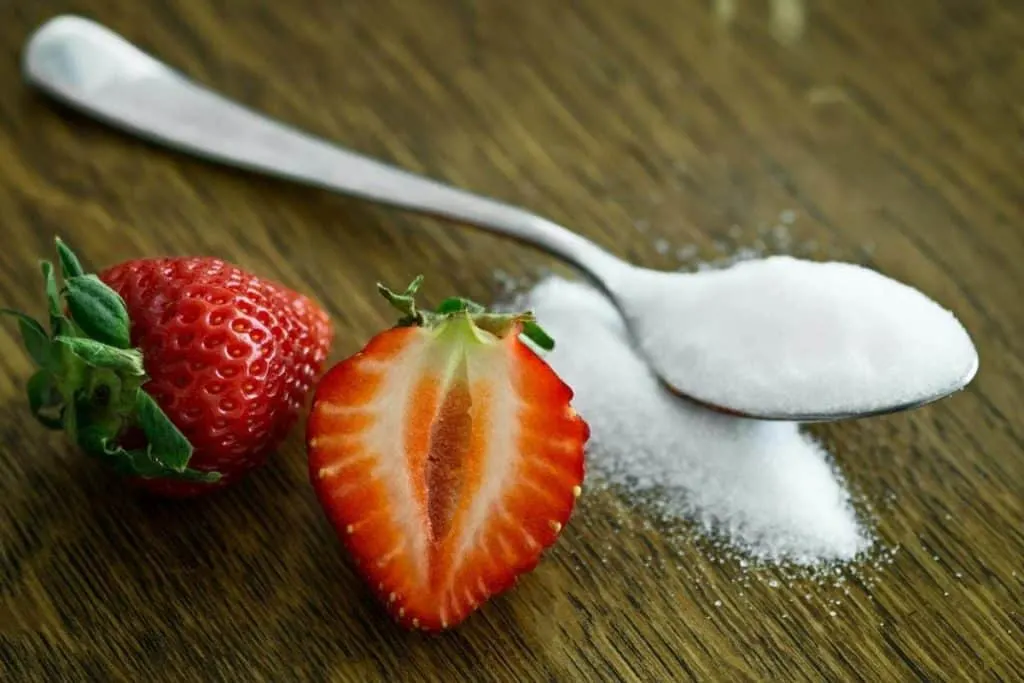
That said, Mountain Dew Kickstart has 20g of total sugar, 16g of added sugars, and offers 80 calories per 16 fl.oz can. This amount is still below the recommended daily intake.
All in all, the two are pretty close in terms of what they offer. So, if you’re keener on a quick rush, Mountain Dew Kickstart might be for you.
But, if you’re more mindful of your sugar intake, then skipping on the caffeinated juice and going for your regular brewed coffee would be better.
Although, water is still the best choice if you are looking for the healthiest options.
Is Mountain Dew Kickstart Bad For You?
In moderation, consuming Mountain Dew Kickstart is completely fine as long as you have a healthy lifestyle and aren’t sensitive to caffeine.
If you’re new to energy drinks, I think Mountain Dew Kickstart would make a first good choice due to its moderate caffeine content. Its 90mg of caffeine is good enough to give you spurge of energy without the overwhelming side effects.
Unlike highly caffeinated energy drinks like Bang Energy and Reign Energy (300mg of caffeine each), Mountain Dew Kickstart seems like a friendlier choice, especially if you’re looking to cut down your daily caffeine intake.
But it also has a high sugar content, mainly from the high fructose corn syrup, so it’s always a good idea to only have Mountain Dew Kickstart when you really need it.
All in all, too much of a good thing can eventually turn out bad, so while Mountain Dew Kickstart seems less intimidating than other strong energy drinks, it’s best to prioritise your health and only limit yourself to one can per day.
Is Mountain Dew Kickstart Better than Other Energy Drinks?
Mountain Dew Kickstart has a significantly lower amount of caffeine and sugar compared to stronger energy drinks like Red Bull or Monster.
| Energy Drink Brands | Caffeine (per 16 fl.oz) | Sugar (per 16 fl.oz) |
| Mountain Dew Kickstart | 90mg | 36g |
| Game Fuel | 90mg | 46g |
| Red Bull | 171.43mg | 54g |
| Monster | 160mg | 54g |
In my opinion, it might not be the better option as an energy drink.
Although, this question ultimately relies on what you look for in an “energy drink”. Especially considering that Mountain Dew Kickstart isn’t advertised as an energy drink but as a caffeinated juice.
So, Does Mountain Dew Kickstart Work?
Looking through the nutrition facts above, it shows that Mountain Dew Kickstart is a sparkling juice that offers 80 calories, 90mg of caffeine per 16fl.oz can. It also boasts having 5% juice and electrolytes.
Along with the amount of sugar that it has, it certainly does deliver in terms of it working as a caffeinated juice that will wake you up in the morning.
Mountain Dew Kickstart Flavors
The Mountain Dew Kickstart flavors are as follows:
- Orange Citrus
- Fruit Punch
- Black Cherry
- Limeade
- Strawberry Kiwi
- Pineapple Orange Mango
- Blood Orange
- Midnight Grape
- Blueberry Pomegranate
- Watermelon
- Orange Cranberry
- Mango Lime
- Raspberry Citrus
- Original Dew
- Grape
Personal Opinion
In my opinion, Mountain Dew Kickstart is a good choice for when you want something milder than a regular energy drink, but is still quite above sodas for the caffeinated boost.
Given the amount of caffeine and sugar present in a can of Mountain Dew Kickstart, it would be pretty surpising if the drink didnt work.
Of course, although it seems to be a milder version of an energy drink, I recommend drinking Mountain Dew Kickstart sparingly or in moderation, as although it’ll give you a boost, it’s not exactly the healthiest drink out there.
